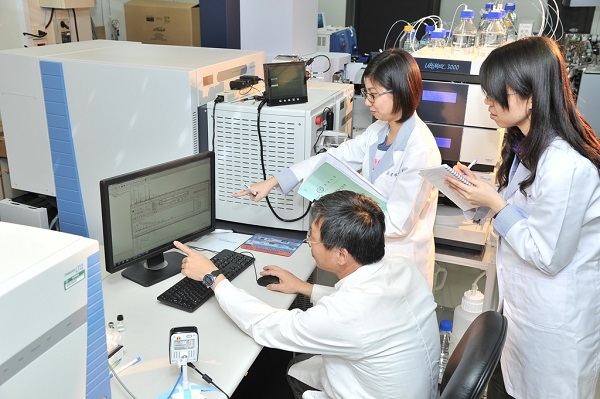Chang Gung University joined US Cancer Moonshot Program
Holding prospective visions and planning in the study of "cancer biomarkers", Chang Gung University (CGU) has accumulated extensive capabilities and resources in the field of genomics and proteomics with remarkable achievements, and recently joined the war against cancer called "Cancer Moonshot" which was proposed by US Vice President Joe Biden. The CGU President Bao Jiaju said that CGU is proud to be a member of this project team, and will be committed to further research to develop more in-depth understanding of the molecular biology of cancer to affirm the potential of cancer treatment and its diagnosis.
On September 19, the US Vice President Joe Biden published an important speech regarding Cancer Moonshot during the Social Good Summit 2016 held in New York, while the former Deputy Minister of National Science Council (now Ministry of Science and Technology), Henry Sun has represented Taiwan to attend the event and meet Biden together with the ambassadors from other countries and invited guests, including CGU President too.
Cancer is the leading cause of death in Taiwan for over 30 years since 1982, with averagely 29 out of 100 people have died of cancer, whilst standardized mortality rate (SMR) has increased from about 80 people to 130 people per 100,000 population. On the other hand, as expressed in common terminology by the citizen, currently there is 1 person diagnosed with cancer every 5 minutes and 18 seconds, which is 8 seconds faster than the previous year’s record, and it had been accelerated by 1.5 times within a decade. These numbers have shown that cancer has become the biggest health threat to our citizens.
The World Health Organization (WHO) also predicts that the number of diagnosed cancer and cancer deaths will increase significantly in the next 2 decades, from 14.1 million in 2012 to 22 million in 2030. The current global cancer care costs have reached as high as USD$ 1 trillion per year, suggesting that cancer is not only impacting on people’ health, but also significantly increases the financial burden of a country.
US President Barack Obama announced in January 2015 that the United States will launch the Precision Medicine initiative, whilst Vice President Joe Biden also proposed the Cancer Moonshot in June this year striving to accelerate those cancer related preventions, diagnosis, treatments and cure which originally could be achieved in ten years but in just five, thus this project has provided a far-reaching impact on human health. To achieve this goal, the National Cancer Institute (NCI), in collaboration with research institutions in Canada, China, Germany, Sweden, Japan, South Korea and Taiwan, has pioneered a novel proteogenomics strategy for large-scale cancer patient sample analyses to explore the pathogenesis of disease, as well as detection and treatment clues.
Chang Gung Molecular Medicine Research Centre (CGMMRC) is the only academic institution in the nation that conducts translational medicine research with Cancer Biomarker as the main research scope. It has 10 core facilities and a variety of research platforms, which are suitable for various studies in the biomedicine field. CGMMRC integrates research resources and manpower in the molecular medicine field of both CGU and Chang Gung Memorial Hospital (CGMH), selects prospective projects as well as identifies and validates cancer biomarkers from proteomics and genomic research platforms. With the established cancer databases and the disease network, the systematic analysis of "biomarkers" on their biological functions, information transmission pathways, physiological and pathological significance can be conducted during the occurrence of cancer in order to establish the clinical application with the theoretical basis and achieve the goal of translational medicine. The CGMMRC has made great achievements in translational medicine research, including the establishment by Chang Gung Proteomics Core Laboratory (CGPCL) on the early detection of oral cancer biomarker group, the establishment by the Genomics Core Laboratory on the detection of colorectal cancer biomarker group and the development of automatic analysis platform of cancer mutant gene detection, as well as the development of high sensitivity detection reagents on lung cancer and colorectal cancer gene mutation. Chang Gung team has proved to have the basis and ability for the implementation of accurate medicine.
In 2015, CGU signed a Memorandum of Understanding with the NCI-led Clinical Proteomic Tumor Analysis Consortium (CPTAC) to deepen tumor-related research. The goal of NCI CPTAC is to understand the tumor from a molecular perspective and achieve the goal of diagnosis and cure of cancer. Through this international cooperation, both the parties can accelerate the understanding of tumor and share their precious research resources and achievements. In addition, the memorandum also includes exchange scholars, co-sponsored seminars and jointly published research results.
In response to the formal launch of the Cancer Moonshot, both parties signed a revised version of the contract in 2016 to expand the scope of cooperation. Chang Gung University has became a member of this important world-class research team, striving to execute the proteogenomics strategy by analyzing a large number of samples of cancer patients with major cancers such as oral cancer, colorectal cancer and others. In addition to the contribution to the war against cancer for the mankind, it also provides Taiwan with important clues of curing the disease and accelerates the new guidelines of the provision of accurate medical treatment to our citizens.
|

